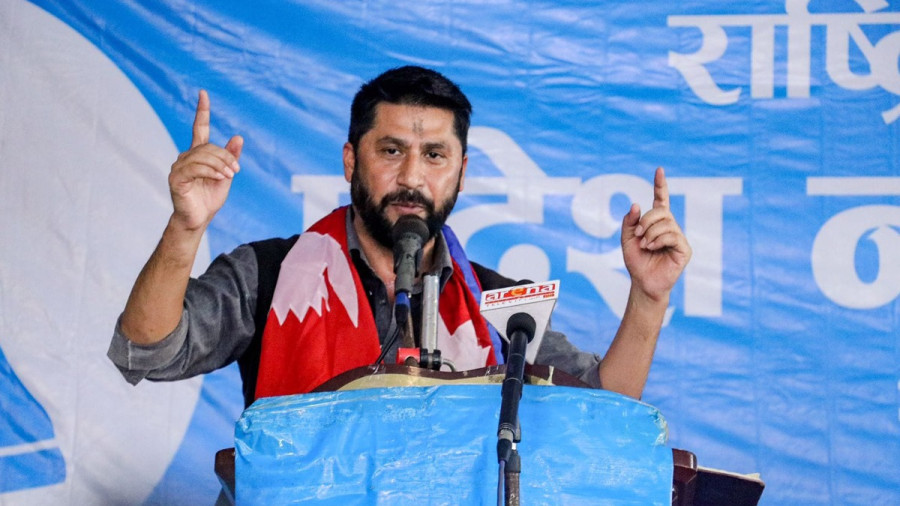Columns
The burden of trust: RSP’s challenges
Members of the Rastriya Swatantra Party are young, educated, and driven, which is good but not enough.
Naresh Koirala
The Rastriya Swatantra Party (RSP) is going to the Parliament with 20 seats, which is a significant achievement for a party registered less than six months before the election. It got there by encroaching on the vote banks of all three major parties: The Nepali Congress (NC), the Communist Party of Nepal (United Marxist-Leninist), and the Communist Party of Nepal (Maoist Centre). The NC's and the UML's proportional votes were nearly 15 percent less than in 2017; the Maoists beat the RSP by barely 40,000 votes. The older parties mocked the RSP's success as a "flash in the pan".
The RSP does run the risk of being a "flash in the pan" if it fails to deliver the promises it made during the election. The delivery is fraught with serious challenges, both external and internal. But the party is not without the opportunity to be an enduring force in our political landscape.
External challenges
Politics and political leaders in Nepal have become metaphors for deceit and corruption. The RSP emerged from the people's growing anger with pervasive corruption and consequent economic stagnation. It made fighting corruption its cause célèbre. To maintain its credibility, it has to convince its voters that it is actively fighting the corrupt and producing results.
But with only 20 seats in Parliament dominated by older parties, its capacity to fight corruption with any effect is limited. It may have a chance if it forges an issue-based alliance with the likes of the Rastriya Prajatantra Party (RPP) and independents who have also won the election on the anti-corruption agenda.
The alliance's first task in Parliament should be to propose the reopening of the corruption files buried in various government agencies. Both the NC and the UML are likely to resist the proposal. They know what is hidden in those files; much of the corruption happened under their watch and with their connivance. The resistance from the older parties will leave the RSP and its partners no option but to report to the public why their efforts failed. How the public will respond is difficult to predict. It could trigger a national anti-corruption movement, but it may not!
Curiously, the anti-corruption protest rallies in the last few years, led by individual corruption crusaders, have failed to coalesce into an organised national movement. That is why the older parties mock the RSP's rise as a “flash in the pan”. They do not seem to recognise that the RSP and other anti-corruption candidates’ election victory and their expected call for action in the Parliament may change the dynamic by giving new hope and impetus to the people agitating for action.
A false sense of invincibility by the perpetrators of wrongdoing and unpredictability of timing is in the nature of any large public uprisings. Festering public anger is like a volcano etching to explode. What looks implausible today becomes inevitable tomorrow. Witness what happened during the Arab spring! What happened in Sri Lanka just a year ago? There is no reason something similar may not happen in Nepal. People are angry and are looking for a change.
No one wants instability and national uprising. This can be averted if younger leaders not tainted by corruption take the reins of power. At the time of this writing, it does not look like that will happen.
Even if public pressure forces the government to be more flexible in reopening the old files, removing corruption in the long term will require legislative work to strengthen existing anti-corruption laws and enforcement of the new laws. New laws are required to prevent conflict of interest, election cost control, control of politicisation of bureaucracy and constitutional bodies and many others. RSP and its partners should initiate the drafting of such laws.
These are difficult tasks and the RSP will have to remain united, relevant, and purpose-driven to be effective. As a young party, going forward, it will face many internal challenges with which it will have to deal expeditiously to be able to deal with these challenges.
Internal challenges
The members of RSP are young, educated, and driven, which is good but not enough. The party needs a defined political ideology, money to operate and a nationwide organisation to remain viable. Before long, a political party without an ideological anchor turns into a cult. Witness the three big parties. The NC leadership has made a mockery of its founding ideals of "Democratic Socialism". The Communist parties’ use of the prefix "Communist" with their name is nothing more than a leftover from the past. The bosses of all three parties operate like dictators, primarily aiming to capture national resources to enrich themselves and their party. No one protests.
Political ideology defines a party's values. The RSP will have to develop its policy positions within the context of an interdependent 21st century world on sensitive policy matters, e.g. rastriyata (nationalism), economy, environment, climate change, and governance. These policies must be compatible with the party’s core political ideology. Otherwise, the party will be trapped in perpetual conflict with itself.
The party will need money to operate. How will it finance itself? How will it maintain cohesiveness in the face of financial difficulties and inducements from big businesses and parties, which is sure to come?
The RSP carries a huge burden of people’s trust and has an opportunity to effectively challenge the fossilised old parties if they remain honest and respectful of that trust. Perhaps, before they start their party meetings, every executive should collectively remind themselves of the burden of the trust and note that its betrayal will be a disaster. They will do well if, before making any decision, they ask themselves, "How is this decision going to help the people (rather than myself) in the short and long term"?




 13.12°C Kathmandu
13.12°C Kathmandu















